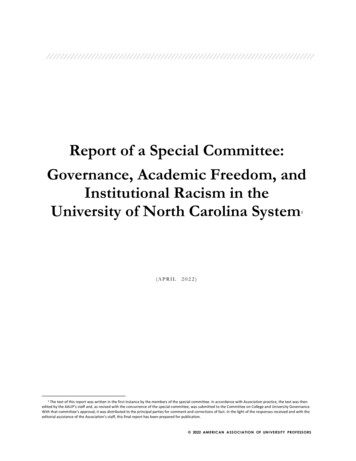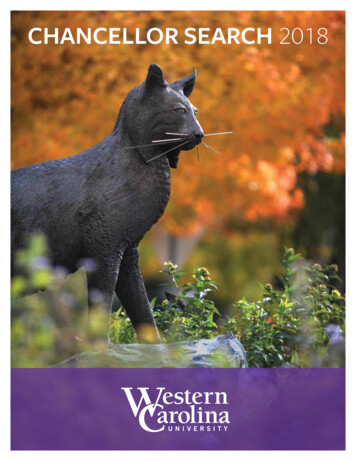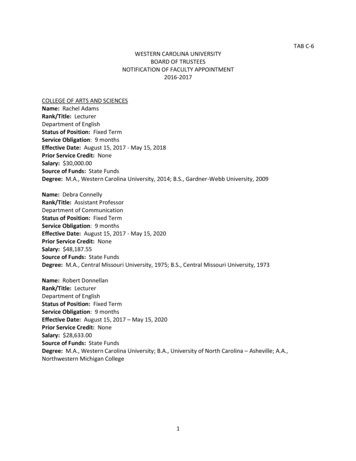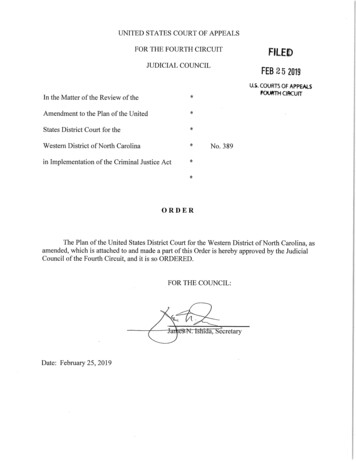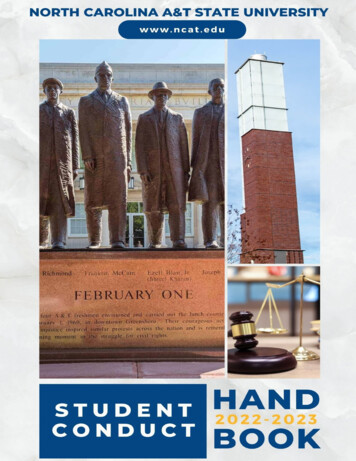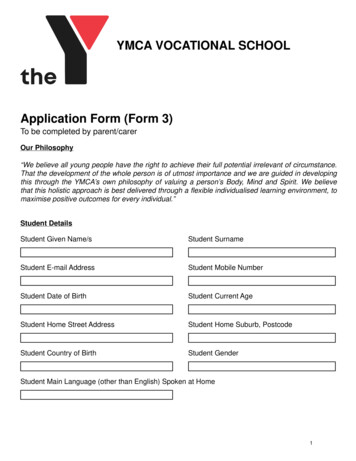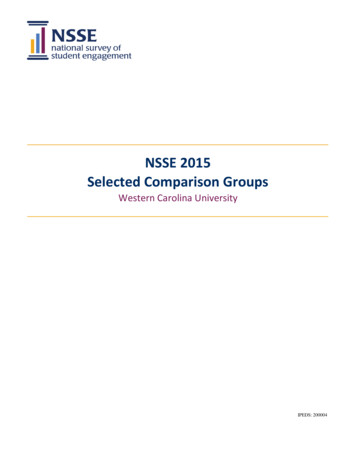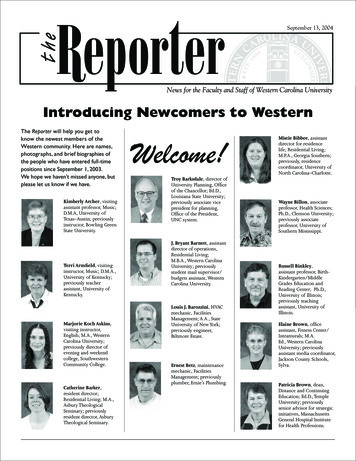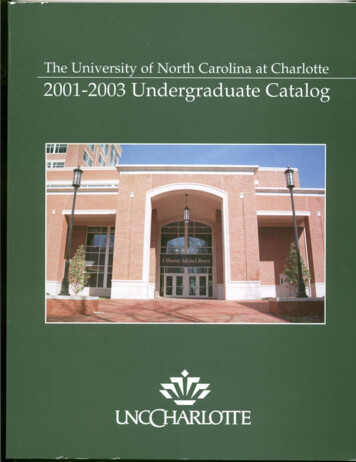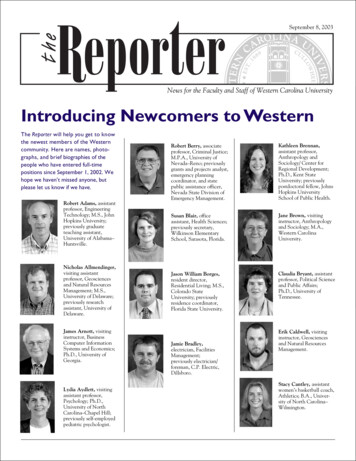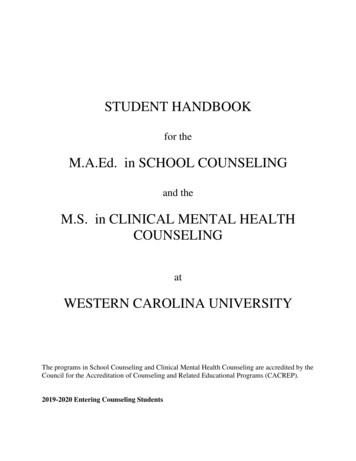
Transcription
STUDENT HANDBOOKfor theM.A.Ed. in SCHOOL COUNSELINGand theM.S. in CLINICAL MENTAL HEALTHCOUNSELINGatWESTERN CAROLINA UNIVERSITYThe programs in School Counseling and Clinical Mental Health Counseling are accredited by theCouncil for the Accreditation of Counseling and Related Educational Programs (CACREP).2019-2020 Entering Counseling Students
2TO THE STUDENTThe WCU Counseling faculty welcome you to your program in professional school or clinicalmental health counseling. We hope you enjoy your program and benefit greatly from it. Wealso look forward to getting to know you better and learning from you.The purpose of this student handbook is to provide you with a written guide as you progressthrough your program. We ask you to consult it frequently. Among other things, this handbookcontains a description of your program and its expectations and requirements. The handbookalso refers you to other valuable sources of information such as the WCU Graduate School,University and professional websites, and the Counseling Program website.Every effort has been made to assure the accuracy of this handbook at the time of its printing.However, changes in or elimination of provisions contained herein on any and all mattersincluding courses, course descriptions, and program policy may be made and applied before thenext handbook is published. It is the intention of the faculty to inform you of changes as theyoccur.We hope that you find this handbook useful. So that we can continue to improve the quality ofthe handbook in the future, we invite you to share with us in writing your ideas, suggestions, andobservations regarding its contents.The Student Handbook is available on line through our program ols-colleges/ceap/humanserv/coun/ (click on“Resources”).
3TABLE OF CONTENTSPage #Topic5The Counseling Programs at Western Carolina University: A Brief History7Program Offices771010Faculty and StaffFacultyFaculty Contact InformationStaff10Organizational Structure1111111313Accreditation, Missions, and ObjectivesWestern Carolina UniversityCollege of Education and Allied ProfessionsDepartment of Human ServicesProgram of Counseling141415Program DescriptionsM.A.Ed. in School CounselingM.S. in Clinical Mental Health Counseling15161616171920Program RequirementsProfessional CoreSchool Counseling SpecializationClinical Mental Health Counseling SpecializationSuggested Order of StudyIndependent Study ProcessComprehensive Examination20212425Field ExperiencesPlacement Process for Field ExperienceContinuity of Training During Field PlacementField Placement Retention262627282829Program ExpectationsInformed Consent for Counselors in TrainingFaculty Expectations of Student ProgressAcademic PerformanceProfessional and Personal DevelopmentClinical Skill Development/Performance30Progress Evaluation and Retention
43030343536Academic Policies of the WCU Graduate SchoolAcademic Integrity Policy and ProcessGrounds and Process for AppealAcademic Dismissal PolicyAcademic Action Appeal Policy4343444444Endorsement and CredentialingNational Certified Counselor (NCC) and National Counseling Exam (NCE)Licensed Professional Counselor (LPC)North Carolina Department of Public Instruction: Licensed School CounselorContinuing Education45454646Professional OrganizationsAmerican Counseling Association (ACA)Council for Accreditation of Counseling and Related Educational Programs(CACREP)North Carolina Counseling Association (NCCA)46Counseling Advisory Committee4747474747484849495050505050General InformationNew Student OrientationStudent Centers and Support ServicesStudent Directory and EmailCounseling Connections newsletterFinancial AidScholarshipsAdvisement and RegistrationInactive Status or Leave of AbsenceProgram Change ProcedureCredit TransferApplication for GraduationCounseling ServicesCareer Planning and Placement Services515152535455Program ChecklistsMAEd in School Counseling Curriculum ChecklistSchool Counseling Program ChecklistMS in Clinical Mental Health Counseling Curriculum ChecklistClinical Mental Health Counseling Program ChecklistSemester-by-Semester Planning Sheet
5COUNSELING PROGRAMS AT WESTERN CAROLINA UNIVERSITY:A BRIEF HISTORYThe information provided in this brief history is based largely on a review of undergraduate andgraduate catalogs, commencement programs, and student records in the Human Servicesdepartmental office. It is also based partly on the recollections of individuals who have beeninvolved with counselor education since its early days at Western Carolina University (WCU).Although there are some gaps and omissions in both the written records and personalrecollections available, this record of the programs in counseling is reasonably complete andaccurate.The preparation of individuals as school counselors began in the mid-1950s. This initialpreparation consisted of a number of courses which led to certification by the North CarolinaDepartment of Public Instruction, but did not comprise a master's degree program. One of theindividuals who became certified through this program was Dr. Mary Wayte. Later, in the fall of1963, she became a counselor educator at WCU. One of her professors was Dr. Luther Taff,who left WCU to become a counselor educator at the University of North Carolina at ChapelHill. Some of the courses available in the mid-1950s were Principles and Techniques ofCounseling, Educational and Occupational Information, Analysis of the Individual, andGuidance in the School.The courses that were used in the certification of individuals as school counselors in the mid1950s had their origins in courses that were available "on demand" as early as 1941. Thesecourses were Principles of Guidance, Vocational Guidance, Guidance Clinic, and MentalHygiene and their appearance in the catalogs closely followed the creation of the GuidanceClinic by Dr. Carl D. Killian in 1940. The Guidance Clinic was primarily a testing center andoffered its services to the University, public schools in the area, and, following World War II, toveterans through a contractual arrangement with the Veterans Administration.The M.A.Ed. program in professional school counseling first appeared in the catalog for theacademic year 1960-1961. It consisted of 45 quarter hours, of which 27 hours were specificallyrequired and 18 hours were approved electives. By the end of the academic year 1961-1962,seventeen individuals had completed the M.A.Ed. program in school counseling. Dr. MaryWayte was an early director of the professional school counseling program.The summer school catalog for 1968 lists, for the first time, an M.A.Ed. program in “non-schoolcounseling” (predecessor to clinical mental health counseling). Dr. Bob Rigdon, who finishedhis M.A.Ed. in counseling at WCU in 1963, had an individualized program which was aforerunner of the non-school counseling program. Dr. Rigdon, who joined the faculty as acounselor educator in 1967, directed the non-school counseling program. The degreedesignation for this program was changed from M.A.Ed. to M.S. effective Spring 1994. Theprogram title later changed to Community Counseling and in Summer 2010, to Clinical MentalHealth Counseling. In Summer 2006, both specialty areas moved from 48-hour to 60-hourdegrees.An M.A.Ed. program in two-year college counseling (student personnel services in higher
6education) was first listed in the graduate catalog for school year 1971-72. Dr. Hal Salisbury,who joined the faculty as a counselor educator in 1970, directed the two-year college counselingprogram. Dr. Salisbury also served as director of the WCU Testing and Counseling Centerswhich evolved from the Guidance Clinic originally established by Dr. Killian. For a time,faculty members in counselor education staffed the Testing and Counseling Centers in additionto their teaching responsibilities. The program in student personnel services in higher educationwas declared inactive in 1988 and was deleted effective January 1992. There is a graduateprogram in Higher Education Student Affairs (HESA) today at WCU, but (though it is housed inthe same department) it is not affiliated with the Counseling program.A Certificate of Advanced Study (C.A.S.) program in counseling was established in 1980. It waspreceded by one year by a counseling specialization in the Educational Specialist (Ed.S.) degreein Curriculum and Instruction. Both the C.A.S. and Ed.S. were declared inactive in 1987. TheC.A.S. program in school counseling was reactivated as of January 1991 and was deleted finallyby action of the University of North Carolina General Administration in 1995-1996.In addition to the current faculty and the individuals already mentioned, there are a number ofothers who have served as counselor educators or who taught courses which were part of thecertification process prior to the development of the graduate degree programs in counseling atWCU. These individuals include the following: Dr. Neill Scott, Mr. Taylor Huskins, Mr. MinorWilson, Dr. John McGeever, Dr. Stephen McIntosh, Dr. David McMillan, Dr. Nan Zimmerman,and Dr. Sherry Baldwin. Full-time faculty in the degree programs in Counseling who no longerteach at WCU include (in order of termination of service): Dr. Dan Saddler, Dr. Jim Morrow,Dr. Larry Grantham, Dr. Michael Garrett, Dr. Mary Deck, Dr. A. Michael Dougherty, Dr. DaleBrotherton, and Dr. Valerie Schwiebert.There are no records to indicate the number of individuals who have completed certification/licensure programs in professional school counseling and no reliable estimate can be made.Commencement programs are the best source of information on the number of individuals whohave earned graduate degrees in counseling. Unfortunately, one commencement program ismissing from the files and, for several years, M.A.Ed. graduates were not identified by major.For a few years, counseling graduates were identified as such, but not by their area withincounseling. A careful review of student files in the departmental office was necessary to fill inthe gaps created by missing or incomplete information on graduates. Through August 2019,1,631 individuals have been identified as having completed graduate programs in counseling; ofthese, 869 have completed the M.A.Ed. in school counseling, 695 have completed the M.A.Ed.or M.S. in community or clinical mental health counseling, 40 completed the M.A.Ed. in studentpersonnel services in higher education, 27 completed the C.A.S. in counseling, and fourcompleted the counseling specialization in the Ed.S. program in Curriculum and Instruction.Western Carolina University is accredited by the Southern Association of Colleges and Schools(SACS). The M.S. in clinical mental health counseling and the M.A.Ed. in school counseling areaccredited by the Council for Accreditation of Counseling and Related Educational Programs(CACREP). These programs were first accredited by CACREP in 1993, and reaccredited in2000, 2007, 2015, and 2017. Our current CACREP accreditation is valid through October 2023.The M.A.Ed. in professional school counseling is additionally accredited by the National
7Council for Accreditation in Teacher Education (NCATE; now the Council for the Accreditationof Educator Preparation/CAEP) and the North Carolina Department of Public Instruction (NCDPI).PROGRAM OFFICESCounseling faculty offices are at WCU-Biltmore Park 2 Town Square Suite 320 (across the streetfrom the main WCU-BP building). The abbreviation for this office space is 2TS. Additionally,there is one Counseling office on main campus in Killian Building.Staff serving the counseling program, as well as other programs, include: Ms. Rena McKay, theDepartment of Human Services administrative support associate in Killian 208 (MWF) and 2TS(TR), and Ms. Denise Royer, the department’s student services specialist in Killian 206 (TR) and2TS (MW). They and graduate assistants (GAs) respond to routine calls and handle the day-today office needs of the faculty. The departmental office in Cullowhee is open from 8:00 a.m. to5:00 p.m., Monday through Friday; telephone number is (828) 227-7310.At WCU-Biltmore Park, staff include: Dr. Kevan Frazier, Executive Director of WCU Programsat Biltmore Park (WCU-BP); Ms. Suzan Melvin, WCU-BP administrative specialist (both in BP100); Ms. Kelly McIntyre, WCU-BP Student Services Specialist, and a WCU-BP administrativespecialist 5:00-9:00pm (in BP 355). WCU-BP, located at 28 Schenck Parkway, is open Mondaythrough Thursday from 8:00 a.m. to 9:00 p.m., and Friday and Saturday from 8:00 a.m. to 5:00p.m.; the telephone number is (828) 654-6498.FACULTY AND STAFFFacultyDr. Russell C. Curtis, Professor and Coordinator of Clinical Mental Health Counseling.Originally from Charlotte, North Carolina, Dr. Curtis earned his bachelor’s degree in BusinessManagement from North Carolina State University. He earned his master’s degree from theUniversity of North Carolina at Charlotte. His doctorate is in Counseling and CounselorEducation from the University of North Carolina at Greensboro. He joined the WCU faculty infall of 2000.Following a career in banking, Dr. Curtis has two and one-half years’ experience working as amental health counselor in a community mental health center in Rock Hill, South Carolina. Hisnational professional memberships include the American Counseling Association. Dr. Curtis is aNorth Carolina Licensed Professional Counselor.Dr. Merry Leigh Dameron, Assistant Professor. Dr. Dameron joined the WCU faculty in Fall2019. A native of Black Mountain, North Carolina, Dr. Dameron earned her bachelor’s degreein Communications at Gardner-Webb University, master’s degree in School Counseling fromLenoir-Rhyne University, and her doctorate in Counselor Education and Supervision from TheUniversity of North Carolina in Charlotte.Dr. Dameron has eight years of professional school counseling experience at the elementary,middle, and high school levels. She is a member of the American Counseling Association,American School Counseling Association, Association for Counselor Education and
8Supervision, Southern Association for Counselor Education and Supervision, North CarolinaSchool Counseling Association, and the Chi Sigma Iota Honor Society. She is a licensedprofessional school counselor in the states of North Carolina and Tennessee.Dr. Melodie H. Frick, Associate Professor and Director of the Counseling Program. Dr. Frickjoined the WCU Counseling Program in Fall 2012. A native of Asheville, North Carolina, sheearned her bachelor's degree in Psychology from the University of North Carolina-Greensboro,master's degree in Community Counseling from Western Carolina University, and Ph.D. inCounselor Education and Supervision from the University of Virginia.Dr. Frick has practiced clinical mental health counseling in outpatient mental health agencies andprivate practice since 1997. She is a Licensed Professional Counselor-Supervisor, NationalCertified Counselor, and an Approved Clinical Supervisor. Her professional membershipsinclude the American Counseling Association, Association for Counselor Education andSupervision, Association for Lesbian, Gay, Bisexual, and Transgender Issues in Counseling,International Association of Marriage and Family Counselors, Southern Association forCounselor Education and Supervision, and the North Carolina Counseling Association.Dr. Elizabeth Graves, Assistant Professor, Coordinator of Professional School Counseling, andCoordinator of Professional School Counseling Field Experiences. Prior to joining the WesternCarolina University counseling program faculty in Fall 2016, Dr. Graves taught middle schooland high school English in North Carolina for five years, earned her master’s in SchoolCounseling at Western Carolina University, and then counseled in rural Western North Carolinamiddle and elementary public schools for 10 years.After earning her LPC, she worked in the emergency department, child and adolescentpsychiatric hospital, and clinical mental health settings. She completed her doctorate at TheUniversity of North Carolina at Greensboro in 2012, where she studied the factors that fosterresilience in survivors of child trauma such as sexual abuse. Dr. Graves then taught and servedin the capacity of program director for the Professional School Counseling program atAppalachian University for five years before joining the counseling faculty at Western CarolinaUniversity. Supplemental to her work with clients and kids, she holds certificates in spiritualformation from Sursum Corda (Charleston, SC), yoga from Neighborhood Yoga TeacherTraining (Boone, NC), and Motivational Interviewing from MINT (international MotivationalInterviewing Network of Trainers).Dr. Elizabeth Likis-Werle, Assistant Professor and Coordinator of Clinical Mental Health FieldExperiences. Dr. Likis-Werle joined the WCU Counseling faculty in August 2018, after sixyears as faculty at East Tennessee State University where she was the Director of theCommunity Counseling Clinic and Coordinator the College Counseling Student Affairsconcentration. She earned her doctorate in Counselor Education and Supervision from UNCGreensboro where she explored the experiences of college women's drinking in relation totheir gender identity. She earned her master’s in Counseling from Western Carolina University,and her bachelor’s degree in Psychology from Wofford College.
9She has been living and working in the Asheville area since the mid-1990s including working atthe UNC-Asheville Counseling Center and the WCU Counseling Center. She has been aLicensed Professional Counselor for 18 years, and has worked in residential wilderness camps,as a school-based therapist, intensive in-home therapist, program manager with a foster andadoption agency, and at Copestone Psychiatric IOP program. Her research interests are collegestudent mental health, identity development, substance abuse, women’s and girl’s issues, andmedia influence of risky behaviors.Dr. Lisen C. Roberts, Associate Professor and Department Head of Human Services. Dr.Roberts joined the Counseling faculty in Fall 2001. Prior to that, she served for four years asProgram Director of Child and Family Studies at WCU. Dr. Roberts grew up in upstate NewYork (with summers in Finland and Martha's Vineyard). From Keene State College in NewHampshire, she has a bachelor's degree in Secondary Special Education and a master's degree inCounseling. Her doctorate is in Family Studies, with a cognate in Counseling, from TheUniversity of Tennessee.Dr. Roberts has five years’ public school experience and is a North Carolina licensed schoolcounselor. She is a member of the American Counseling Association, the Association forCounselor Education and Supervision, the North Carolina Counseling Association, and the NorthCarolina School Counselor Association.Dr. Phyllis Robertson, Professor. Dr. Robertson joined the Counseling faculty in Summer of2005. A native of Hendersonville, North Carolina, Dr. Robertson earned her bachelor’s degreein Psychology at the University of North Carolina-Asheville. She has a master’s degree inSchool Counseling from Western Carolina University. Her doctorate in Counselor Education isfrom The University of South Carolina.Dr. Robertson has 15 years of professional school counseling experience at the elementary andmiddle school levels. She is a member of the American Counseling Association, the AmericanSchool Counseling Association, the North Carolina School Counseling Association, the SouthernAssociation for Counselor Education and Supervision, and the Association for Lesbian, Gay,Bisexual, and Transgender Issues in Counseling. She is a North Carolina state licensed schoolcounselor.Dr. E. Heather Thompson, Associate Professor and Coordinator of Testing. Dr. Thompsonjoined the WCU faculty in Fall 2009 after completing her Ph.D. in Counselor Education andSupervision at the University of Virginia. She has a bachelor’s degree in History from SouthernMethodist University, master’s degree in Community Agency Counseling from the University ofMemphis, and is a Nationally Certified Counselor. Prior to joining the faculty at WCU, herprofessional experience included individual and group work in both agency and school settings.Some of the broad issues addressed in her clinical work and scholarship include domesticviolence, sexual abuse, child abuse, crisis counseling, and play therapy. Her nationalprofessional memberships include the American Counseling Association, Association ofCounselor Education and Supervision, and the Association for Play Therapy.
10Faculty Contact informationDr.Dr.Dr.Dr.Dr.Dr.Dr.Dr.Russ CurtisMerry Leigh DameronMelodie FrickElizabeth GravesElizabeth Likis-WerleLisen RobertsPhyllis RobertsonHeather -227-2291828-227-2635828-654-6562Support staffCullowheeThe WCU Counseling Program Offices are in the Department of Human Services. The mainoffice is in room 208 Killian Building on the WCU campus in Cullowhee. The office may bereached by telephone at (828) 227-7310. Departmental office hours are 8:00 a.m. to 5:00 p.m.,Monday through Friday. Dr. Lisen Roberts is the Human Services Department Head. Ms.Denise Royer (droyer@email.wcu.edu) is the department’s Student Support Specialist. Ms.Rena McKay (remckay@email.wcu.edu) is the department’s Administrative Support Associate.Biltmore ParkA resident administrative staff consisting of Dr. Kevan Frazier, Executive Director, Ms. SuzanMelvin, Ms. Kelly McIntyre, Support Associates, an evening Support Associate, and a number ofGraduate Assistants support all programs offered in Biltmore Park (Asheville) by WesternCarolina University. With offices located in suite 100 (3rd floor after 5pm) at 28 SchenckParkway in Biltmore Park, the staff are available to assist students on matters related toadmission and application procedures, registration, scheduling appointments with advisors,financial assistance, textbooks, class schedules, student services, library services, tuition, andpayment of fees. The offices are open Monday through Thursday from 8:00 a.m. to 9:00 p.m.and Friday and Saturday from 8:00 a.m. to 5:00 p.m.; the telephone number is (828) 654-6498.Kevan Frazier’s email is kdfrazier@email.wcu.edu.ORGANIZATIONAL STRUCTUREThe Counseling program exists within the Department of Human Services, which exists withinthe College of Education and Allied Professions.Western Carolina University (chancellor, Dr. Kelli Brown) is divided into 6 Colleges: College ofArts and Sciences; College of Business; College of Education and Allied Professions; College ofEngineering and Technology; College of Fine and Performing Arts; and College of Health andHuman Sciences.The College of Education and Allied Professions (dean, Dr. Kim Winter) is divided into 3 Units:Department of Human Services; Department of Psychology; and School of Teaching andLearning.
11The Department of Human Services (department head, Dr. Lisen Roberts) is divided into 8umbrella Programs: Birth-Kindergarten (director, Dr. Cathy Grist); Counseling (director, Dr.Melodie Frick); Educational Leadership (director, Dr. Jess Weiler); Higher Education StudentAffairs (director, Dr. April Perry); Human Resources (director, Dr. John Sherlock); Parks andRecreation Management (director, Dr. Andrew Bobilya); and School Administration (director,Dr. Heidi Von Dohlen); and service unit Project Discovery (director, JennieV Sorrells).ACCREDITATIONS, MISSIONS, AND OBJECTIVESWestern Carolina UniversityAs the westernmost institution in the University of North Carolina system, WCU providescomprehensive educational opportunities to residents in the state’s western region and attractsstudents from around the globe to explore the region’s vast natural diversity. Founded in 1889 asa teaching college, WCU now provides an education to more than 10,000 students inundergraduate and graduate programs.Western Carolina University is accredited by the Southern Association of Colleges and SchoolsCommission on Colleges to award baccalaureate, masters, and doctorate degrees. WesternCarolina University has been accredited by SACSCOC since 1946; the last accreditation reviewtook place in 2017.Western Carolina University is a public regional institution of higher education whose mission isto create learning opportunities that incorporate teaching, research, service, and engagementthrough on-campus, off-campus, on-line, and international experiences. The university focusedits undergraduate, master’s and three doctoral programs, educational outreach, research, creative,and cultural activities to sustain and improve individual lives and enhance economic andcommunity development in Western Carolina and beyond.The story of WCU is one deeply connected to the people of our region; we are rooted in ourservice to the people of Southern Appalachia and beyond. WCU belongs not just to our studentsand our faculty and staff, but to the whole community, for we are integrally connected to thisregion as its educational, economic, and cultural center. Our vision is to be a national model forstudent learning and engagement that embraces its responsibilities as a regionally engageduniversity.Western Carolina University is committed to excellent in teaching and learning, collaborationwith a respect for our communities, free and open interchange of ideas, responsible stewardship,organizational and environmental sustainability and cultural diversity and equal opportunity.These are the values that guide our approach to education and service daily.The College of Education and Allied ProfessionsThe College of Education and Allied Professions is home to WCU's leading programs in teachereducation as well as numerous programs in human services such as Counseling, Parks andRecreation Management, Human Resources, and Educational Leadership. In addition, programs
12in Psychology, which is one of WCU's Top 5 undergraduate majors, are housed in the college.No matter what program you choose, the College of Education and Allied Professions willprovide extensive opportunities for hands-on learning through field experiences, outreachprojects, research and professional mentorship.Welcome to the College of Education and Allied Professions (CEAP). The primary role of theCollege is to prepare educators, counselors, psychologists, speech-language pathologists,recreation personnel and other human service specialists at both entry and advanced levels.These professionals will staff public elementary, secondary, postsecondary schools, sport andrecreation agencies, and other human service organizations in North Carolina and the regionbeyond.The College fulfills its mission by developing and maintaining a community of scholars thatpromotes and recognizes good teaching, service, and research. Of these three scholarlyactivities, providing optimal learning environments for students is most important, followed byservice and research. CEAP provides undergraduate and graduate programs, including bothtraditional and online instruction.The mission of the professional education programs at WCU is to prepare highly effective andethical graduates that are inspired to be lifelong learners, engaged in the community, andempowered to become leaders who strive to transform the future. Professional educationprograms at WCU include preparation programs for teachers, administrators, counselors, schoolpsychologists, and child and family development professionals at the undergraduate, graduate,and doctoral levels.The mission of the CEAP professional education programs at Western Carolina University is toprepare highly effective and ethical graduates that are inspired to be lifelonglearners, engaged in the community, and empowered to become leaders who striveto transform the future.The primary role of the CEAP is to prepare educators, counselors, school psychologists,recreation personnel and other human service specialists at both entry and advanced levels.These professionals will staff public elementary, secondary, postsecondary schools, sport andrecreation agencies, and other human service organizations in North Carolina and the regionbeyond. The College fulfills its mission by developing and maintaining a community of scholarsthat promotes and recognizes good teaching, service, and research. Of these three scholarlyactivities, providing optimal learning environments for students is most important, followed byservice and research.The College strives to provide leadership and technical assistance for the improvement of teacherpreparation and elementary and secondary schooling in North Carolina, the nation, anddeveloping countries. The College is strongly committed to partnering with the public schools toeducate pre-service teachers to teach all children to high standards, to assist beginningprofessional educators to be successful and remain in the profession, and to provide quality staffdevelopment for career professional educators. Additional fundamental roles of the College are
13to serve the liberal studies program of the University and to offer programs and special clinicalservices that relate closely to the mission of the College and that are needed by its constituencies.The College fulfills its mission by creating and nourishing a community of learners guided byknowledge, values, and experiences. The guiding principles of the community of learnersinclude: (a) the belief that the best educational decisions are made after adequate reflection andwith careful consideration of the interests, experiences and welfare of the persons affected bythose decisions; (b) an appreciation of and respect for diversity; and (c) a commitment tofostering the responsible use of technology.Department o
(CACREP). These programs were first accredited by CACREP in 1993, and reaccredited in 2000, 2007, 2015, and 2017. Our current CACREP accreditation is valid through October 2023. The M.A.Ed. in professional school counseling is additionally accredited by the National
